S4. Creative writing, podcasts and more with the help of AI
skip to Session 5 - Humanoid Robots
Session 4 - Outline for Students
This session starts by looking at how a typical AI Chat or Conversation tool can help with writing creative fiction. It will also examine using AI for typical business writing such as submitting a grant application, or preparing a podcast, webpage or presentation.
Introduction
Soon an AI will be able to produce endless numbers of top quality novels in a fraction of a second. Why then would any human write fiction beyond this point? There is a clear parallel with the game of chess however. The best human chessmasters can no longer match the best AI systems in any way. Millions of people continue to enjoy playing the game of chess every day however, undaunted by their relative lack of skill. So with fiction writing and other extended writing tasks.
Here is an opening paragraph written in January 2025:
Evening draped the honey-hued cottages like a secret too fragile to confess, while the solitary bell in Saint Oswin’s tower tolled with disquieting insistence. Behind the ivy-choked window, a lone candle threw soft light onto a trembling hand clutching a letter—an urgent missive rumoured to bear the key to ruin. Outside, the wind rattled ancient oak boughs as though in warning, each gust a whisper to stay indoors or risk confronting what lay beyond. The silhouette within hesitated, poised between dread and discovery, the next toll of the bell near enough to set every nerve aflame. In that pause, the Cotswolds’ gentle façade quivered, hinting at the sort of secret that could unmake a village.
Of course, some still debate whether AI will ever be the equal of the best human writers. A similar claim is made for the best artists. Time will tell, but what do you think?
Section A. AI to assist writing fiction
Here we ask one such tool, Chat GPT from OpenAI chat.openai.com a series of questions to show a little of what is possible (from April 2024).
Note that the interchanges shown here are with ChatGPT 4 which is the subscription version of the tool [at March 2024], and therefore a more recent and far stronger AI than the previous version ChatGPT 3.5. Often when you see or hear reports about AI not being not very good they are from people who did not wish to pay a subscription and who have access only to the older less able model. ChatGPT 5 is not yet released but will be significantly better still, according to industry rumours.
See also the recently announced: openai.com/index/hello-gpt-4o/ .
A1. AI for generating plot ideas
There will come a time before long when AI generates great long-form fiction without any human intervention at all. Indeed, it is already a very capable assistant to a human writer. Most of us have limited skills in this area but with the help of AI anybody can have a lot of fun.
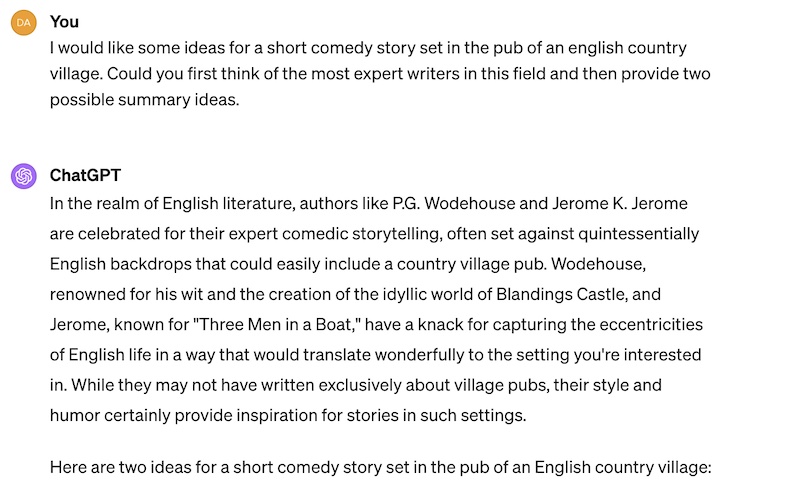
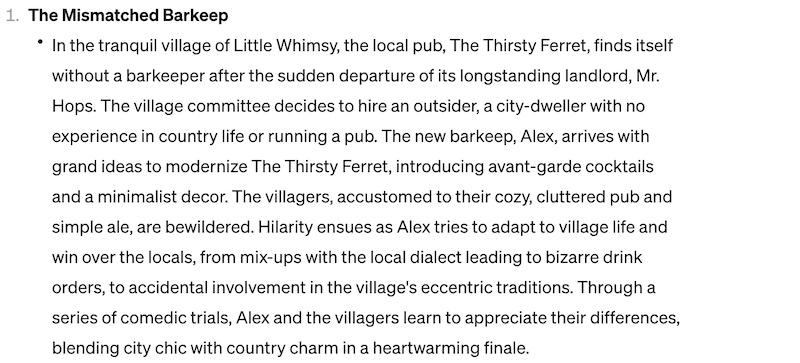
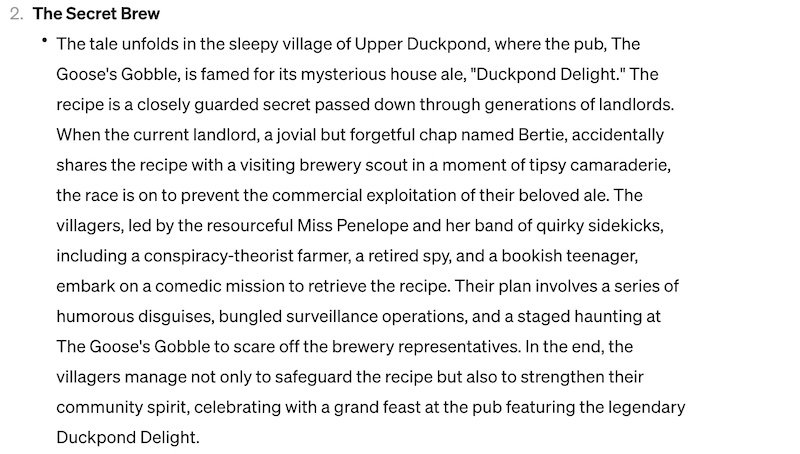
Remember that AI has infinite patience and can generate new ideas as many times as you want. It also has a vast knowledge of existing writers and their styles. You could refine the prompt many times until you get an outline plot that fits your own style.
A2. AI for developing characters
Once the outline plot has been chosen, a writer needs interesting and well developed characters. AI has an infinite number of suggestions to provide somewhere to begin.

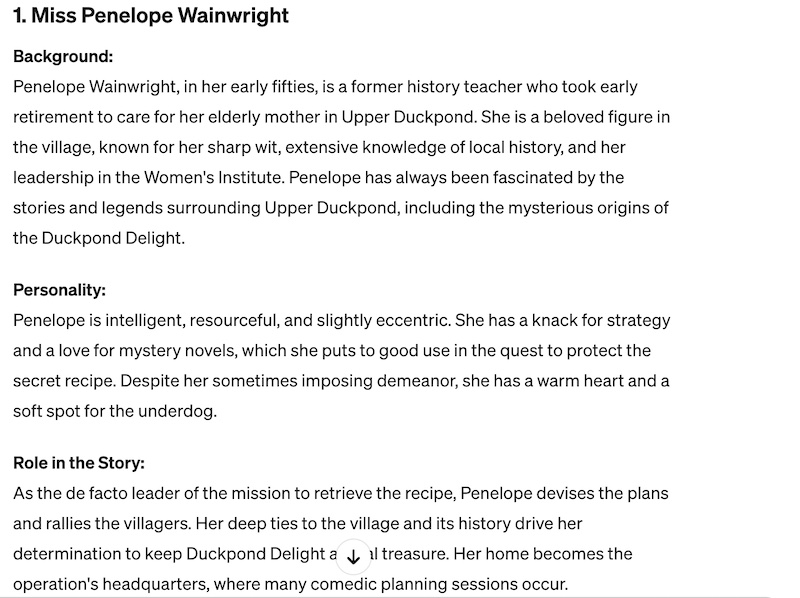
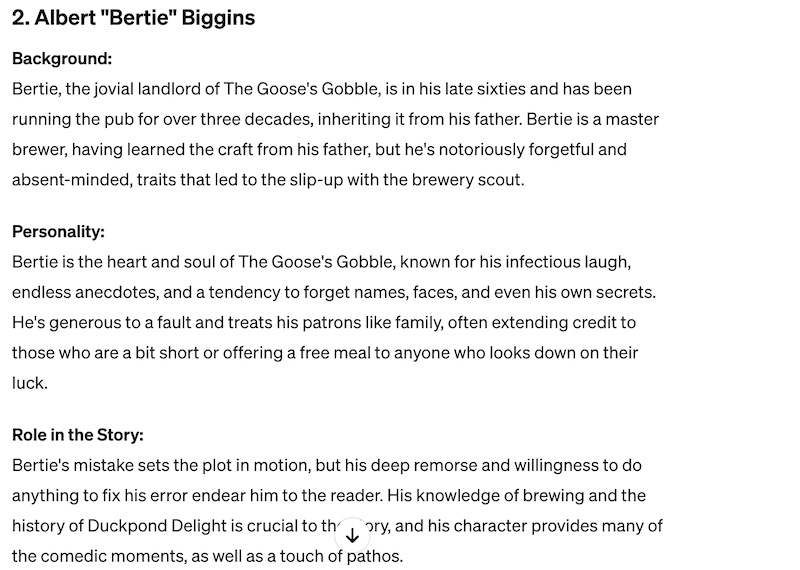
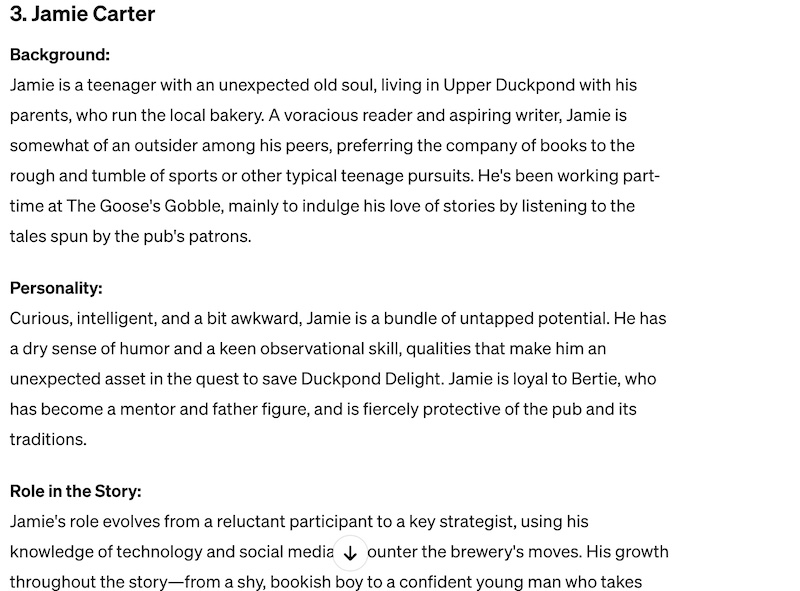
A3. AI for evolving characters
The AI suggested characters will probably not suit the writer's needs at first, so many changes may be made before a final combination is arrived at. Beware that the AI doesn't slip in any other changes when you did not request them and are are not expecting them though. A general purpose AI will not understand your requirement for consistency so will continue to be endlessly inventive, often when you least expect it and not necessarily in a helpful way.
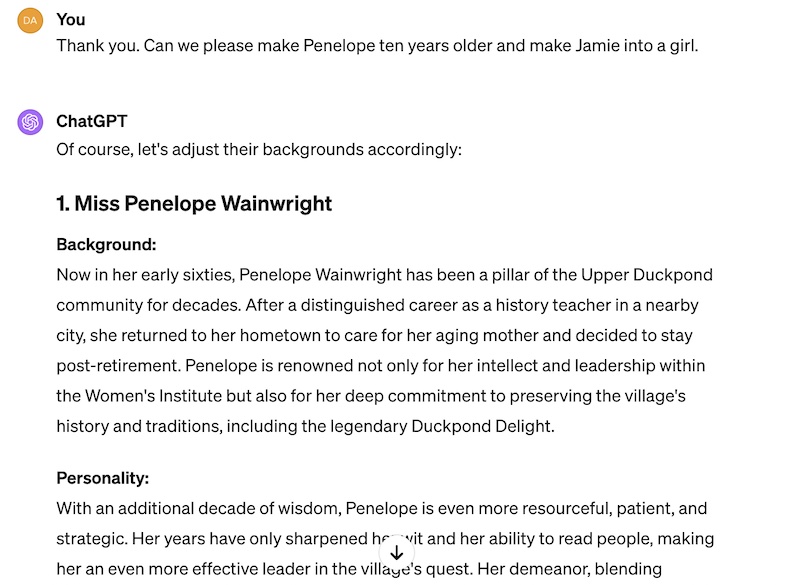
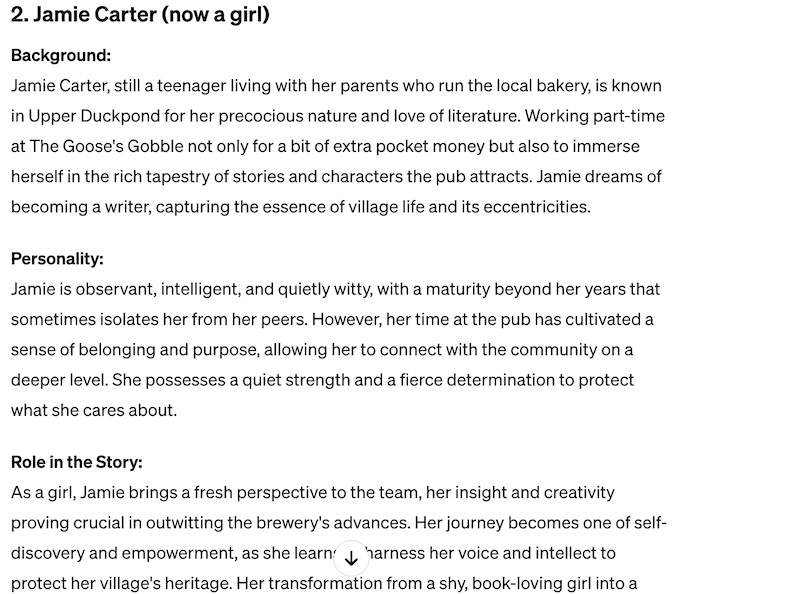
A4. AI, stereotyping and over adjustment
Above ChatGPT was simply asked to change the character of Jamie from male to female. It could have left most other aspects as before but it also made other subtle changes. Here is one simple one.
Our original male Jamie had a 'knowledge of technology and social media'.

Our female Jamie instead has 'insight and creativity'.

There are many reasons why AI systems act this way. Part of the reason is because they are trained on all existing literature which has inbuilt bias. A second reason is because they then go through a second type of training which involves human feedback, and that will tend to reflect the 'political' opinions of the trainers. This can be overcome by an author but it will always be a factor when AI systems are used.
Note that some AI companies also adjust the way their AI provides answers by adding hidden instructions to the prompt you send. They may, for example add the words 'ensuring proper diversity' which, as might be expected, can produce different results to the ones prompted for. The intent is noble but as a result many people prefer to use 'open source' AI tools which are less likely to do this than corporate productions.
A5. AI writing the opening scene
Wonderful though it would be the complete a whole short story here, we will content ourselves with asking ChatGPT to write the opening sequence to introduce our three characters.
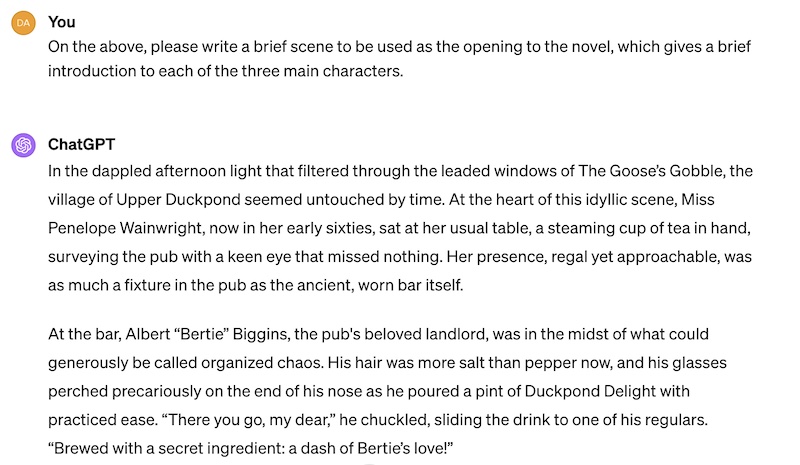
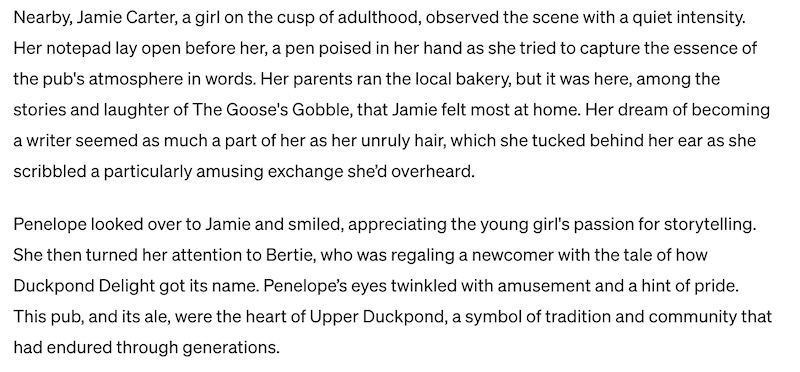

A6. AI as a writer's assistant, editor and critic
a. Ensuring consistency. In even a medium sized novel it can be very difficult to avoid trivial mistakes such as making a character red-haired at one point and blond several chapters later. Even now some of the AI tools can accept a document the length of a large novel and absorb its content instantly. A writer can therefore pass in the complete latest draft and then ask for comments on any aspect, or simply for a reminder of what happened for each character as the novel progressed.
b. Constructive criticism. Every budding writer has experienced the feeling of being demolished when they showed a cherished piece of writing to a friend or family member, only to get more direct advice that they were hoping for. AI on the other hand can, if asked correctly, provide the most positive of criticism.
c. Alternative and improved phrasing. Any good AI tool will happily take in a chunk and writing and provide a selection of rewrites for you to choose between. It will also spots typos and other problems.
A7. Specialist writing tools
There are several AI tools which are designed specifically for use by fiction writers, or indeed writers in general including creators of social media content. Please note that it is generally unwise to sign up to an annual plan with any specialist AI tool. New tools emerge each month which may be better or cheaper or both.
Note also that the more general AI conversation tools like ChatGPT and Gemini may be nearly as good, or even better, in due course. Sometimes tools like those below in any case turn out to be simply 'wrappers' on top of one of the major tools. Again, wherever possible avoid long term commitment wherever possible even if you like one of these. Without recommendation and in no particular order, below is a short list.
7.1 Sudowrite
7.2 Jasper
7.3 Writesonic
7.4 Anyword
7.5 Rytr
7.6 Aithor
Section B. AI to assist wider writing and creative tasks. Example 1: Grant Application
AI can assist with longform writing for many purposes. To illustrate this, here is how AI could assist an organisation seeking a grant. That is typically a time consuming process often requiring seemingly endless boxes to be completed with text.
The tool we used here was Gemini from Google gemini.google.com/. There is further information about this in the 'about Google Gemini' page on this site.
Here is the prompt given to Gemini. Note the instruction to be concise in order that the AI tool returns something we can put on this site below. AI tools are by their nature verbose! Generating words is what they do.

Below is the first answer from Gemini. Pretty good if you yourself have to normally stare at a blank piece of paper for a long time before starting to write.
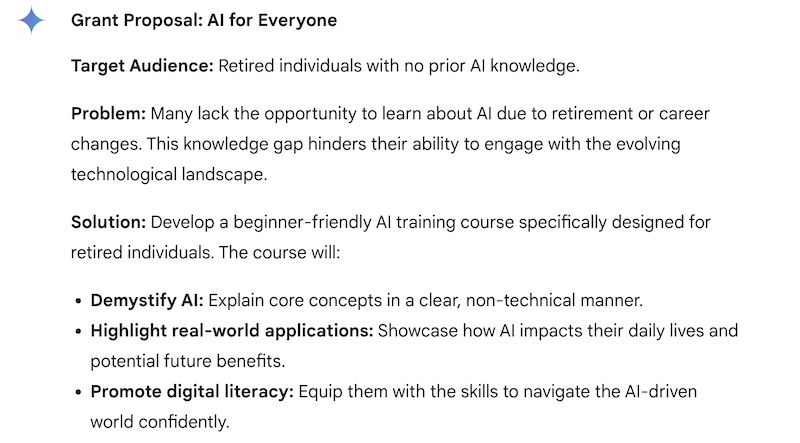
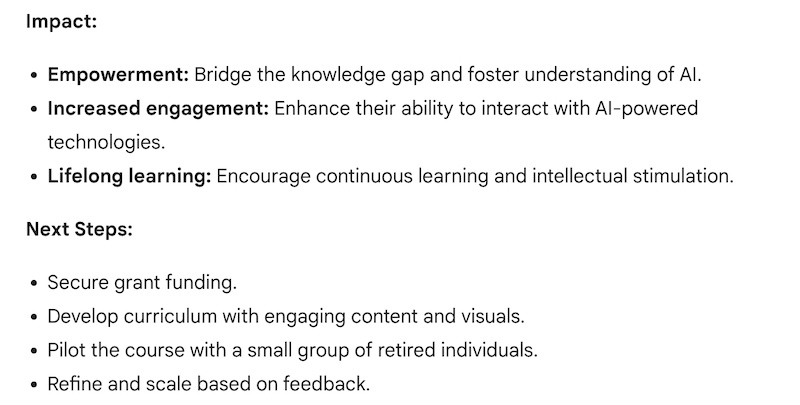
You could ask Gemini to expand sections, to change the emphasis, or any other aspect. Instead lets ask for help in actually identifying suitable grants.

This ability to switch seamlessly around between tasks is a very useful feature of AI tools. Here we can a useful response. Notice that the response has clickable links, for example to the UK government online "Find a grant" service.
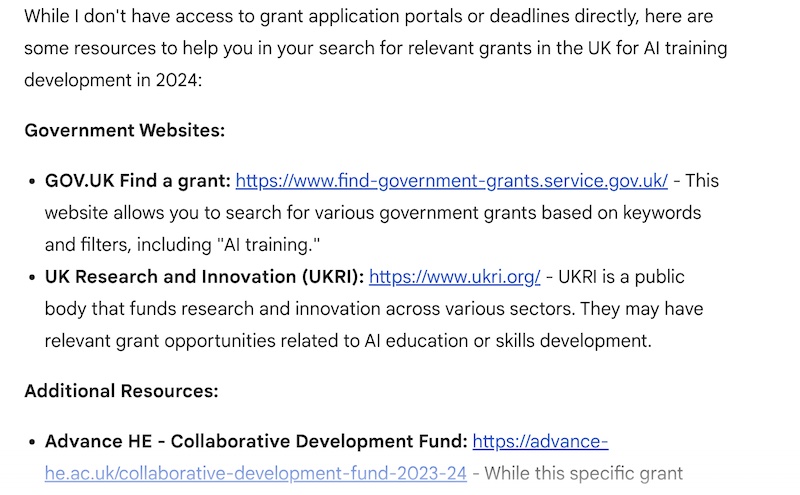
The future. Before long, tools like Gemini, OpenAI and Claude will have a far deeper capacity to not only write parts of a proposal and identify grants, they will source the application form, draft a full application, and track the response of the grant giving organisation. Of course, in time it will simply be one AI system talking to another AI system.
Example 2: Podcasts from Google's AI tool NotebookLM
A 'podcast' is an audio clip which is like a radio show. Some have light content while others tackle serious subjects. They used to be time consuming to edit together. Recently however Google introduced NotebookLM notebooklm.google. This produces a near instant podcast on whatever material it is given, be that a website or a pdf document etc.
In November 2024 it was given a pdf copy of the recently introduced Assisted Dying Bill. A few minuted later it produced the following impressive podcast, shown here in video form.
I put the new Terminally Ill Adults (End of Life) Bill from @kimleadbeater into Google's NotebookLM AI & asked for a podcast. How do you think it did? It is 16 mins long. #AssistedDying #AssistedDyingBill pic.twitter.com/VNJeeDydaN
— The Silver AI Project - free AI training materials (@SilverAIProject) November 12, 2024
Example 3: Shareable Resources using Claude AI's Artefacts
Claude AI can not only produce really useful output such as webpages or financial analyses, it can let you easily share them. For example, here Claude is helping create the itinerary for a holiday.

The area to the right is called the Artefacts area, and in this case you can use it over time to build up a complete and complex document by asking Claude to amend it as new content is decided upon. It has one additional feature of great use. At the bottom right is the PUBLISH button. That provides you with a weblink that you can share.

Example 4: Claude AI's Artefacts to create a Web Page
Any major Chat tool has good coding skills and they can certainly help in producing web pages. Here we see Claude both showing the completed page and the underlying html code used.
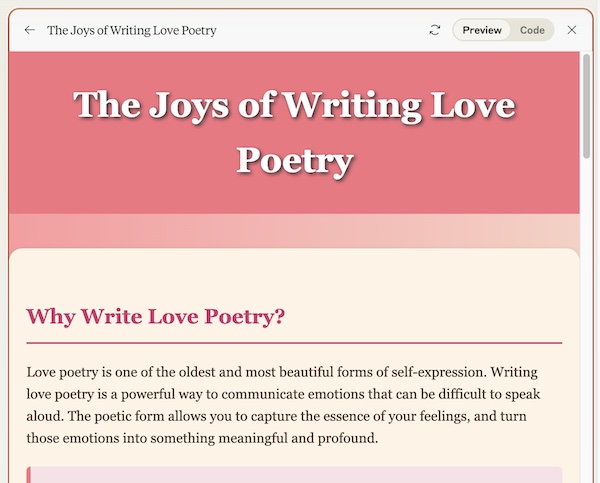

Example 5: Powerpoints
There are now (December 2024) a range of tools that can help you produce a Powerpoint like presentaion with the aid of AI. This includes Microsoft's Copilot for PowerPoint, and SlidesAI for Google's Slides www.slidesai.io as well as many independent tools.